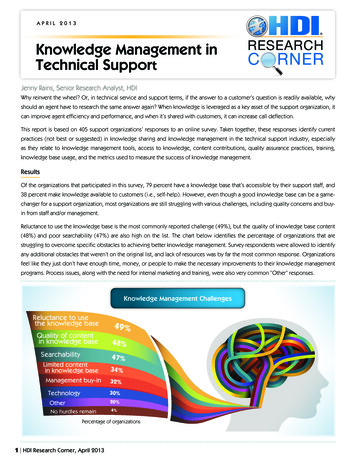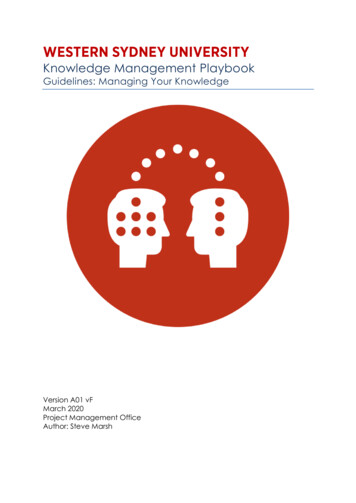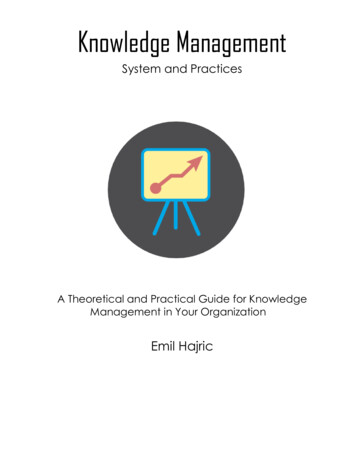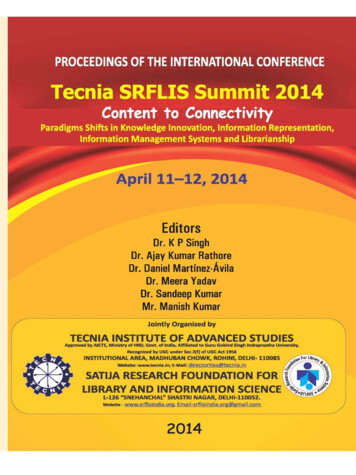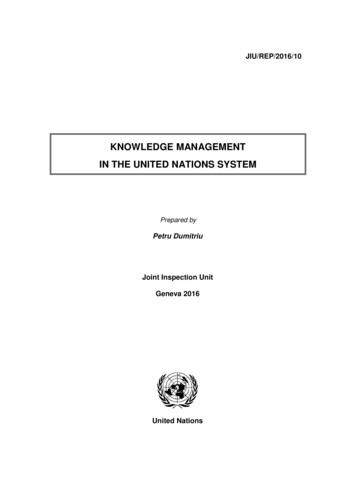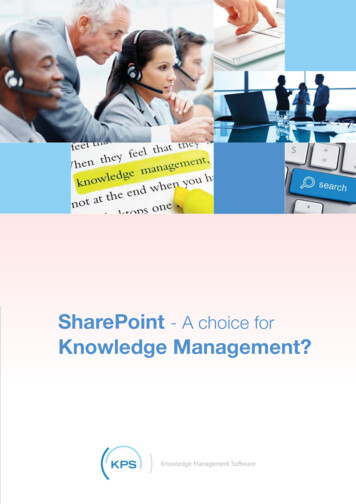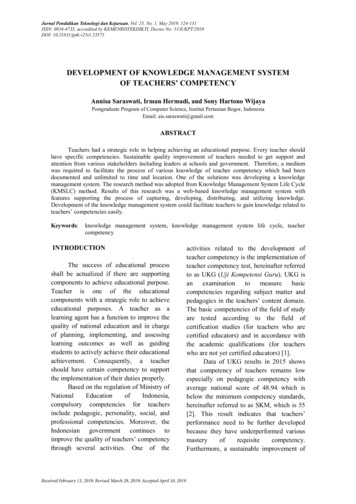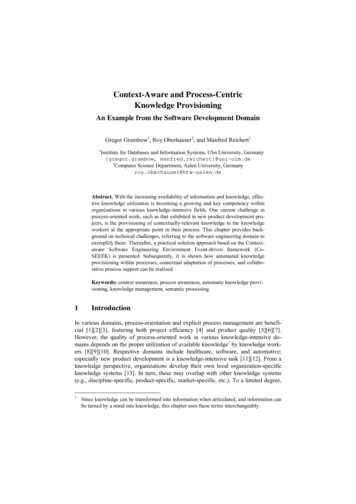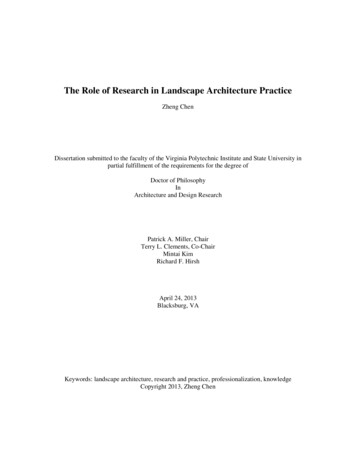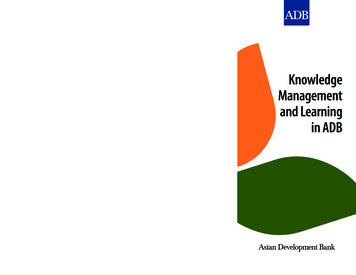
Transcription
Knowledge solutions andknowledge services fueloperations, communities ofpractice, knowledge partnerships,and staff learning.About the Knowledge Management CenterThe Knowledge Management Center facilitates knowledgemanagement activities in ADB. It plays a critical role inintroducing new knowledge management approaches,monitoring the progress of knowledge management, andreporting to ADB Management.About the Asian Development BankEnhancing Knowledge Management under Strategy2020, ADB's plan of action for 2009–2011, deliversknowledge solutions and knowledge services fromfour strategic thrusts: Sharpening the knowledge focus in operationsblends knowledge and insights with large,concessional financing at regional, country, andproject levels; Empowering communities of practices energizesongoing learning venues; promotes greater andbetter informed dialogues; develops, captures,and transfers good practices; quickens personaland team development; and helps ADB lendsmarter;ADB’s vision is an Asia and Pacific region free of poverty.Its mission is to help its developing member countriessubstantially reduce poverty and improve the quality oflife of their people. Despite the region’s many successes, itremains home to two thirds of the world’s poor: 1.8 billionpeople who live on less than 2 a day, with 903 millionstruggling on less than 1.25 a day. ADB is committed toreducing poverty through inclusive economic growth,environmentally sustainable growth, and regionalintegration.Based in Manila, ADB is owned by 67 members, including48 from the region. Its main instruments for helping itsdeveloping member countries are policy dialogue, loans,equity investments, guarantees, grants, and technicalassistance. Strengthening external knowledge partnershipsencourages research and networking oninnovative knowledge products and services; and Further enhancing staff learning and skillsdevelopment builds up staff know-how andencourages knowledge generation and sharing.For more information, contactKnowledge Management CenterRegional and Sustainable Development DepartmentAsian Development Bank6 ADB Avenue, Mandaluyong City1550 Metro Manila, PhilippinesTel 63 2 632 6362Fax 63 2 636 ent/Publication Stock No. ARM090815August 2009KnowledgeManagementand Learningin ADB
Knowledge solutions andknowledge services fueloperations, communities ofpractice, knowledge partnerships,and staff learning.About the Knowledge Management CenterThe Knowledge Management Center facilitates knowledgemanagement activities in ADB. It plays a critical role inintroducing new knowledge management approaches,monitoring the progress of knowledge management, andreporting to ADB Management.About the Asian Development BankEnhancing Knowledge Management under Strategy2020, ADB's plan of action for 2009–2011, deliversknowledge solutions and knowledge services fromfour strategic thrusts: Sharpening the knowledge focus in operationsblends knowledge and insights with large,concessional financing at regional, country, andproject levels; Empowering communities of practices energizesongoing learning venues; promotes greater andbetter informed dialogues; develops, captures,and transfers good practices; quickens personaland team development; and helps ADB lendsmarter;ADB’s vision is an Asia and Pacific region free of poverty.Its mission is to help its developing member countriessubstantially reduce poverty and improve the quality oflife of their people. Despite the region’s many successes, itremains home to two thirds of the world’s poor: 1.8 billionpeople who live on less than 2 a day, with 903 millionstruggling on less than 1.25 a day. ADB is committed toreducing poverty through inclusive economic growth,environmentally sustainable growth, and regionalintegration.Based in Manila, ADB is owned by 67 members, including48 from the region. Its main instruments for helping itsdeveloping member countries are policy dialogue, loans,equity investments, guarantees, grants, and technicalassistance. Strengthening external knowledge partnershipsencourages research and networking oninnovative knowledge products and services; and Further enhancing staff learning and skillsdevelopment builds up staff know-how andencourages knowledge generation and sharing.For more information, contactKnowledge Management CenterRegional and Sustainable Development DepartmentAsian Development Bank6 ADB Avenue, Mandaluyong City1550 Metro Manila, PhilippinesTel 63 2 632 6362Fax 63 2 636 ent/Publication Stock No. ARM090815August 2009KnowledgeManagementand Learningin ADB
Knowledge management toolsstrengthen organizational systemsand processes.Knowledge is what you learn from experience—before, during, and after the event. It can be tacit andexplicit, individual and collective.Individual and collective knowledge are vital resourcesof an organization. The more you know how to dosomething, the better you are at doing it. The morean organization knows and learns from its successesand shortcomings, the more effective it is in achievinggoals.Knowledge is a vital resource ina learning organization.A learning organization is a collective undertaking,rooted in action, that builds and improves its ownpractices by consciously and continuously devisingand developing ways to draw learning from its own(and others’) experiences.A learning organization provides the motive, means,and opportunity for learning to improve performance.Learning is driven by organization, people, knowledge, andtechnology working in harmony. These subsystems urgebetter and faster learning, and increase the relevance ofan organization.Organization, people, knowledge,and technology drive learning,while knowledge management andlearning drive organizational change.Knowledge management is about providing the rightknowledge to the right people at the right time, andhelping them apply it in ways that improve organizationalperformance.To intensify development effectiveness, ADB andits Knowledge Management Center are generatingknowledge solutions and delivering knowledge servicesto internal and external clients, identifying and sharinggood practices and lessons learned, and ramping upperformance.In Strategy 2020: The Long-Term Strategic Framework of theAsian Development Bank 2008–2020, knowledgesolutions are seen as one of five drivers ofchange for ADB to be a more activeagent and partner in development.Knowledge Management in ADB moves ADB to improveits organizational culture, management systems,business processes and information technologysolutions, communities and networks of practice, andlearning and development mechanisms.To implement the framework, ADB uses variousknowledge management tools that focus on strategydevelopment, management techniques, collaborationmechanisms, knowledge sharing and learning, andknowledge capture and dge
Knowledge management toolsstrengthen organizational systemsand processes.Knowledge is what you learn from experience—before, during, and after the event. It can be tacit andexplicit, individual and collective.Individual and collective knowledge are vital resourcesof an organization. The more you know how to dosomething, the better you are at doing it. The morean organization knows and learns from its successesand shortcomings, the more effective it is in achievinggoals.Knowledge is a vital resource ina learning organization.A learning organization is a collective undertaking,rooted in action, that builds and improves its ownpractices by consciously and continuously devisingand developing ways to draw learning from its own(and others’) experiences.A learning organization provides the motive, means,and opportunity for learning to improve performance.Learning is driven by organization, people, knowledge, andtechnology working in harmony. These subsystems urgebetter and faster learning, and increase the relevance ofan organization.Organization, people, knowledge,and technology drive learning,while knowledge management andlearning drive organizational change.Knowledge management is about providing the rightknowledge to the right people at the right time, andhelping them apply it in ways that improve organizationalperformance.To intensify development effectiveness, ADB andits Knowledge Management Center are generatingknowledge solutions and delivering knowledge servicesto internal and external clients, identifying and sharinggood practices and lessons learned, and ramping upperformance.In Strategy 2020: The Long-Term Strategic Framework of theAsian Development Bank 2008–2020, knowledgesolutions are seen as one of five drivers ofchange for ADB to be a more activeagent and partner in development.Knowledge Management in ADB moves ADB to improveits organizational culture, management systems,business processes and information technologysolutions, communities and networks of practice, andlearning and development mechanisms.To implement the framework, ADB uses variousknowledge management tools that focus on strategydevelopment, management techniques, collaborationmechanisms, knowledge sharing and learning, andknowledge capture and dge
Knowledge management toolsstrengthen organizational systemsand processes.Knowledge is what you learn from experience—before, during, and after the event. It can be tacit andexplicit, individual and collective.Individual and collective knowledge are vital resourcesof an organization. The more you know how to dosomething, the better you are at doing it. The morean organization knows and learns from its successesand shortcomings, the more effective it is in achievinggoals.Knowledge is a vital resource ina learning organization.A learning organization is a collective undertaking,rooted in action, that builds and improves its ownpractices by consciously and continuously devisingand developing ways to draw learning from its own(and others’) experiences.A learning organization provides the motive, means,and opportunity for learning to improve performance.Learning is driven by organization, people, knowledge, andtechnology working in harmony. These subsystems urgebetter and faster learning, and increase the relevance ofan organization.Organization, people, knowledge,and technology drive learning,while knowledge management andlearning drive organizational change.Knowledge management is about providing the rightknowledge to the right people at the right time, andhelping them apply it in ways that improve organizationalperformance.To intensify development effectiveness, ADB andits Knowledge Management Center are generatingknowledge solutions and delivering knowledge servicesto internal and external clients, identifying and sharinggood practices and lessons learned, and ramping upperformance.In Strategy 2020: The Long-Term Strategic Framework of theAsian Development Bank 2008–2020, knowledgesolutions are seen as one of five drivers ofchange for ADB to be a more activeagent and partner in development.Knowledge Management in ADB moves ADB to improveits organizational culture, management systems,business processes and information technologysolutions, communities and networks of practice, andlearning and development mechanisms.To implement the framework, ADB uses variousknowledge management tools that focus on strategydevelopment, management techniques, collaborationmechanisms, knowledge sharing and learning, andknowledge capture and dge
Knowledge solutions andknowledge services fueloperations, communities ofpractice, knowledge partnerships,and staff learning.About the Knowledge Management CenterThe Knowledge Management Center facilitates knowledgemanagement activities in ADB. It plays a critical role inintroducing new knowledge management approaches,monitoring the progress of knowledge management, andreporting to ADB Management.About the Asian Development BankEnhancing Knowledge Management under Strategy2020, ADB's plan of action for 2009–2011, deliversknowledge solutions and knowledge services fromfour strategic thrusts: Sharpening the knowledge focus in operationsblends knowledge and insights with large,concessional financing at regional, country, andproject levels; Empowering communities of practices energizesongoing learning venues; promotes greater andbetter informed dialogues; develops, captures,and transfers good practices; quickens personaland team development; and helps ADB lendsmarter;ADB’s vision is an Asia and Pacific region free of poverty.Its mission is to help its developing member countriessubstantially reduce poverty and improve the quality oflife of their people. Despite the region’s many successes, itremains home to two thirds of the world’s poor: 1.8 billionpeople who live on less than 2 a day, with 903 millionstruggling on less than 1.25 a day. ADB is committed toreducing poverty through inclusive economic growth,environmentally sustainable growth, and regionalintegration.Based in Manila, ADB is owned by 67 members, including48 from the region. Its main instruments for helping itsdeveloping member countries are policy dialogue, loans,equity investments, guarantees, grants, and technicalassistance. Strengthening external knowledge partnershipsencourages research and networking oninnovative knowledge products and services; and Further enhancing staff learning and skillsdevelopment builds up staff know-how andencourages knowledge generation and sharing.For more information, contactKnowledge Management CenterRegional and Sustainable Development DepartmentAsian Development Bank6 ADB Avenue, Mandaluyong City1550 Metro Manila, PhilippinesTel 63 2 632 6362Fax 63 2 636 ent/Publication Stock No. ARM090815August 2009KnowledgeManagementand Learningin ADB
Knowledge management is about providing the right knowledge to the right people at the right time, and helping them apply it in ways that improve organizational performance. To intensify development eff ectiveness, ADB and its Knowledge Management Center are generating knowledge solutions and delivering knowledge services

